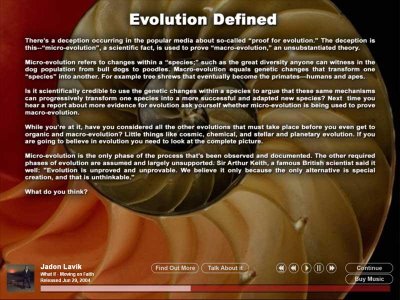If you're not familiar with the premise, the game begins after the Biblical Rapture has occurred, and millions of people have abruptly disappeared. Those "Left Behind" have to choose sides in the final struggle on Earth between God and the Devil. It's fundamentalism all the way as you wage war against the forces of the other side (I understand that in at least some modes, you can play "the Devil's advocate") to gain the most converts and eliminate the most enemies. If you guessed that this game was a fundamentalist proselytization tool aimed at the the young video-gaming crowd, you'd be right. You can read a review at Ars Technica.
Of particular interest is a capture of an "informational" screen in the game...

I suppose it shouldn't surprise me that a fundie video game peddles the same anti-science cliches that fill all Creationist websites and literature, but it's still annoying.
In their "Evolution for Fundies" definition, they use the oft-repeated claim that genetic variation and adaptation within a species (what they call "micro-evolution") is no reason to think that new species can diverge from such populations (what they call "macro-evolution"). Apparently they think that some magical barrier exists that keeps the adaptations from continuing and populations from becoming so dissimilar that they can no longer be considered the same species. They ask "Is it scientifically credible to use the genetic changes within a species to argue that these same mechanisms can progressively transform one species into a more successful and adapted new species?"
The question is phrased poorly, but the nutshell answer is "Yes." It is scientifically credible to argue that in a varied population, the individuals that are best adapted to the environment will have the most reproductive success, and their genes will become more common in future generations. It is scientifically credible to argue that the same mechanisms that create variation within a species can also cause populations to become non-interbreeding and progressively less similar (in both form and genetic makeup) as they adapt to different environments and ways of life. It is scientifically credible to argue that the same mechanism that drives "micro-evolution" would naturally lead to "macro-evolution". The creationists may think it's a rhetorical question, and maybe it is, but they certainly have the answer backwards.
Naturally they escalate from the question of biological evolution to universal cosmology as if the topics were the same. Why should we expect anything new from creationists? They even throw in an out-of-context quote to seal the deal.
Edit: Researching it further, the quote from Sir Arthur Keith -- "Evolution is unproved and unprovable. We believe it because the only alternative is special creation, and that is unthinkable." -- appears to be a creationist fabrication. There is no credible evidence that he said any such thing.

No comments:
Post a Comment